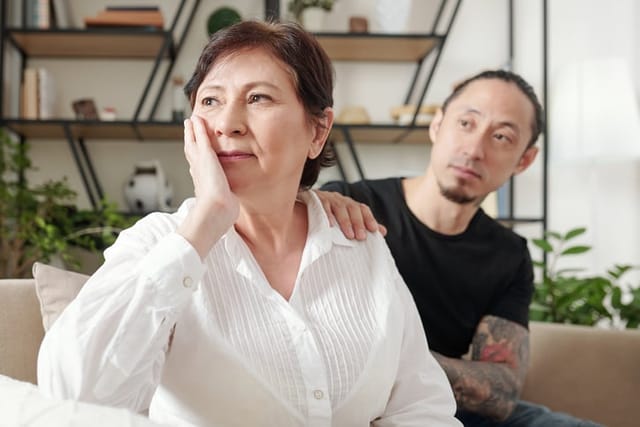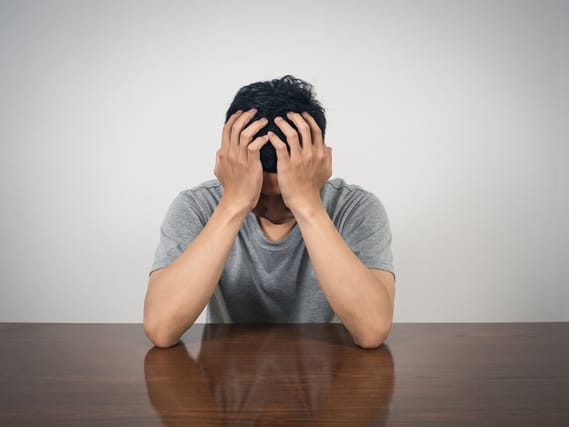Sometimes, the harshest critic in our lives is the voice in our own heads. If you find yourself struggling with self-doubt and a sense of not being good enough, these habits might be keeping you stuck in a negative cycle.
1. They one-up people’s tragedies.

Trying to one-up your friend’s heartbreak is super unhelpful. Everyone’s experience is valid, and their suffering isn’t lessened by your past experiences. Instead of comparing, focus on listening and genuinely empathizing with and supporting them. Let your friend know you’re there for them without judgment, and resist the urge to make it about you.
2. They offer to help even when they’re overwhelmed.
People-pleasing stems from a fear of rejection and a deep desire to be liked. But constantly saying “yes” leads to burnout, resentment, and lets people take advantage of you. It’s okay to say “no” or to set boundaries like “I can help out tomorrow, but tonight I’m completely swamped.” Remember, your time and well-being are just as valuable as anyone else’s.
3. They compare themselves to everyone on social media.
Scrolling through perfect feeds is a recipe for feeling like absolute crap about yourself. Remember, social media is a highlight reel, not real life. Limit your time on these platforms, unfollow accounts that make you feel bad, and remind yourself that everyone has their own struggles. Instead of comparing yourself to others, focus on your own growth and celebrate your unique journey.
4. They put off doing/finishing important stuff.

Putting off tasks because of anxiety or fear of failure is self-sabotage. Break things down into smaller steps, reward yourself for progress, and remember – done is better than perfect. Taking action builds confidence and lessens that feeling of not being good enough. Plus, the feeling of accomplishment when you finally check something off your list is unbeatable!
5. They constantly apologize even when they haven’t done anything wrong.
Over-apologizing for your existence minimizes your worth. You don’t have to apologize for needing space, expressing your opinions, or making small mistakes. Reserve those “sorries” for when you genuinely mess up, and they’ll carry more weight. Own your space in the world and don’t apologize for simply existing.
6. They focus on the negative.
If every compliment is met with a “yeah, but…” you’re filtering out the positive. Challenge your inner critic by making a list of things you’re good at, your accomplishments, and nice things others have said about you. Refer back to it when you’re feeling down, and actively counter that negativity bias.
7. They dwell on past mistakes instead of learning from them and moving on.
Regret can be useful for learning, but excessive obsessing and overanalyzing is only going to work against you. Forgive yourself for past slip-ups, focus on what you can control in the present, and remember that mistakes don’t define you. Everyone makes them – it’s how we grow and become better versions of ourselves.
8. They isolate themselves.
When you feel bad about yourself, withdrawal might seem like the safest option. But connecting with supportive people can lift your mood and offer a different perspective. Reach out to friends, join a group activity, or consider talking to a therapist for extra help. Remember, you don’t have to go through this alone.
9. They rely on external validation to feel good about themselves.

Constantly needing others to tell you you’re awesome is a trap. It feels good for a second, but then you’re right back to doubting yourself. Focus on building that inner confidence – recognizing your own strengths and accomplishments, regardless of what anyone else says. You’re the expert on your worth, and that’s the only validation that truly matters.
10. They give up way too easily.
Hitting a roadblock and bailing makes you feel like you can’t handle challenges. Push through those tough moments, see setbacks as a chance to learn, and remind yourself that anything worthwhile takes effort. Don’t let “I can’t” become your default setting – prove to yourself that you can rise to the occasion.
11. They’re perfectionists.

Aiming for the impossible is a guaranteed way to always feel like a failure. Yeah, strive for your best, but celebrate progress, not just some unattainable fantasy of perfection. Be kind to yourself along the way – you deserve it!
12. They’re a bit too self-deprecating.

Making yourself the butt of the joke might get a few laughs, but it slowly eats away at your self-esteem. Try flipping the script – find humor in the absurdity of life, not in tearing yourself down. Plus, being able to laugh at yourself without demeaning yourself is a sign of real confidence.
13. They ignore their needs.

Putting yourself last means you’ll run on empty, then get resentful of everyone you’ve helped. Self-care isn’t an indulgence, it’s how you refill your tank so you can keep on giving. Schedule in those things that make you feel good, and don’t feel guilty about saying “no” sometimes so you can say “yes” to yourself.
14. They avoid conflict even when it’s necessary.

Always keeping the peace seems nice, but it secretly teaches you that your voice doesn’t matter. Learn how to disagree respectfully and stand up for what you believe in. It might feel awkward at first, but finding healthy ways to communicate actually builds stronger relationships.
15. They don’t acknowledge their accomplishments.

If you only focus on what you haven’t done yet, you miss out on how far you’ve come. Take a moment to be proud of your victories – big and small. It’s not bragging, it’s acknowledging your hard work and boosting that “I can do this” feeling for the next challenge.
16. They hang aroud with people who drag them down.

If your friends are always bringing the drama, complaining, or tearing you down, it’s going to rub off on you. Limit time with those who leave you feeling drained, and seek out people who are positive, supportive, and inspire you to be your best. Your social circle has a huge impact on your outlook, so choose wisely!
Enjoy this piece? Give it a like and follow Bolde on MSN for more!










